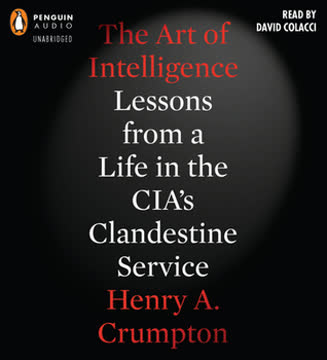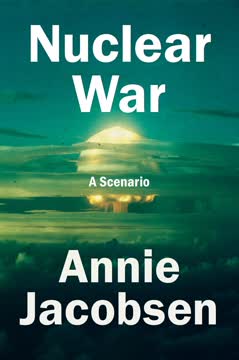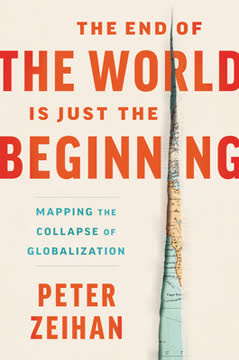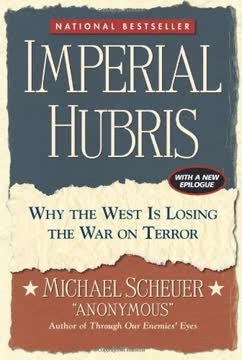Key Takeaways
1. Misunderstanding the Enemy: Rational Insurgents, Not Mad Terrorists
The portrait of bin Laden that emerges is richer, more complex and more accurate than the simple caricature of a hate-filled, mindless fanatic.
Flawed perception. The United States fundamentally misunderstands Osama bin Laden and al-Qaeda, viewing them as irrational, bloodthirsty terrorists rather than rational, religiously motivated insurgents with specific, achievable political goals. This mischaracterization prevents an accurate assessment of the threat and leads to ineffective strategies. Bin Laden is a calculating, patient, and strategic actor, not a "stateless psychopath" or a "madman" driven by nihilistic rage.
Strategic genius. Bin Laden's actions, including the 9/11 attacks, are part of a coherent, long-term strategy aimed at altering US foreign policy in the Muslim world, not destroying Western civilization or its values. He is a "practical warrior, not an apocalyptic terrorist in search of Armageddon," who has demonstrated remarkable planning, managerial expertise, and strategic judgment. His ability to meld religious fervor with a profound sense of grievance into a powerful ideological force is a "towering achievement."
Consequences of misjudgment. By reducing bin Laden to a "madman," US leaders dismiss his profound standing among millions of Muslims and overlook his rightful place in Islamic history as a heroic figure. This prevents the US from understanding the true nature of the conflict and the motivations of its adversaries, leading to policies that are often counterproductive and self-defeating.
2. Religious Hatred: A Principled Response to Perceived Attacks
This hatred shapes and informs Muslim reactions to U.S. policies and their execution, and it is impossible to understand the threat America faces until the intensity and pervasiveness of this hatred is recognized.
Love and hatred intertwined. Bin Laden and his followers are driven by a deep, principled love for God, Islam, and fellow Muslims, which in turn fuels an equally intense and purposeful hatred for perceived US attacks on their faith, brethren, and lands. This is not a hatred of American freedoms or way of life, but a direct response to specific US actions in the Muslim world.
Defensive Jihad. For Muslims, God's word in the Koran and the Prophet's traditions guide all aspects of life, including the responsibility to defend faith and coreligionists when attacked. This is a "defensive jihad," an unavoidable personal duty for each Muslim, not an offensive war of conquest. Bin Laden's genius lies in convincingly arguing that US actions constitute such an attack, compelling Muslims to fight.
Historical resonance. Bin Laden's call for jihad resonates deeply within Islamic history, echoing figures like Saladin who defended Muslim lands against foreign invaders. His personal piety, courage, and willingness to sacrifice wealth for the cause further solidify his image as an Islamic hero, making him a powerful symbol of hope and resistance for millions of Muslims.
3. US Policies Fuel the Jihad: A Self-Inflicted Wound
Indeed, the United States, and its policies and actions, are bin Laden's only indispensable allies.
Direct causation. Bin Laden explicitly states that his war against the United States is a direct response to specific US policies and actions in the Muslim world, not a hatred of American values. These policies provide incontrovertible proof for his narrative of a "Crusader" attack on Islam.
Six key grievances: Bin Laden consistently highlights six US policies that inflame Muslim hatred:
- Unwavering US support for Israel and its actions against Palestinians.
- The presence of US and Western military forces on the Arabian Peninsula.
- The US occupation of Muslim lands like Afghanistan and Iraq.
- US backing for Russia, China, and India in their suppression of Muslim populations.
- US pressure on Arab oil producers to maintain low oil prices, impoverishing Muslims.
- US support for corrupt, tyrannical, and "apostate" Muslim governments.
Counterproductive actions. US actions, even those intended for security or humanitarian aid, are consistently reinterpreted by bin Laden and the Muslim world as further proof of US malevolence. This "stubborn obtuseness" acts as a powerful force-multiplier for bin Laden, validating his claims and driving more Muslims to support his cause.
4. Afghanistan: A Hubristic Lunge to Defeat
So bad has been our performance in Afghanistan that one must assume a long list of Afghan checkables lie—like John Brown's body—a' moldering in a locked and dust-covered archive.
Ignorance of history. The US campaign in Afghanistan was a "lunge to defeat" born of profound hubris and ignorance of Afghan history, culture, and the lessons of previous foreign interventions (e.g., British, Soviet). Despite extensive US intelligence expertise on Afghanistan from the Soviet-Afghan War, this knowledge was largely ignored.
Flawed strategy. The US failed to:
- Seal borders, allowing al-Qaeda and Taliban forces to disperse and regroup.
- Decisively defeat the enemy, instead merely driving them from cities.
- Understand the deep-seated xenophobia and tribalism of Afghans.
- Recognize that money cannot buy Afghan loyalty, only temporary cooperation.
- Appreciate the enduring influence of "old mujahideen" leaders who would eventually ally with the Taliban.
Unstable outcome. The US installed a weak, minority-dominated, and unrepresentative government in Kabul, led by Hamid Karzai, which lacks genuine Pashtun support and is seen as a foreign imposition. This ensures a prolonged insurgency and the eventual return of a Taliban-like regime, making the US war in Afghanistan a self-inflicted disaster.
5. Al-Qaeda's Resilience: Adapting, Expanding, and Enduring
Even catastrophic attacks on the scale of 11 September remain within al Qaeda's reach.
Survival and adaptation. Despite the overwhelming military power of the United States, al-Qaeda has survived the initial onslaught in Afghanistan, adapted its structure, and expanded its reach. The delay in US response after 9/11 allowed for effective dispersal of personnel and resources, preventing a decisive defeat.
Global reach and new domains. Al-Qaeda has maintained a strong presence in established areas like Somalia, Kenya, Southeast Asia, Chechnya, and Saudi Arabia, while actively expanding into new theaters like Iraq and Lebanon. Its most significant growth has been in the virtual domain, leveraging the internet for:
- Propaganda and ideological dissemination (e.g., Al-Neda, Al-Ansar websites).
- On-demand military, security, and intelligence training manuals.
- Recruitment and coordination, bypassing traditional travel risks.
Unbroken momentum. Al-Qaeda's operational tempo and lethality have increased since 9/11, launching attacks in various countries and inspiring allied groups. This demonstrates its enduring capacity to strike and its ability to regenerate, making it a persistent and growing threat.
6. The Semantic Trap: Insurgency Misidentified as Terrorism
The persistent misidentification of bin Laden and al Qaeda as "terrorists" is sponsored by the well-entrenched, well-funded, and sclerotic U.S. counterterrorism (CT) community.
Flawed paradigm. The US mistakenly defines al-Qaeda as a "terrorist group," leading to a law-enforcement, chase-capture-jail approach that is fundamentally ineffective against a large, religiously motivated, and globally dispersed insurgency. This semantic error prevents the development of an appropriate counterinsurgency strategy.
Ineffective tactics. The focus on individual arrests and trials, while yielding tactical successes, does not alter the strategic balance of the conflict. Al-Qaeda's manpower pool is vast, and its members view capture as martyrdom, not deterrence. This approach is resource-intensive and fails to keep pace with al-Qaeda's ability to regenerate and expand.
Misplaced focus. The US obsession with "terrorist training camps" overlooked their primary function: producing thousands of well-trained insurgents, not just a small number of urban warfare specialists. This misjudgment allowed a large, veteran fighting force to be cultivated, ready to challenge US interests globally.
7. Imperial Hubris: Elite Blindness to Reality
This is not a genetic flaw in Americans that has been present since the Pilgrims splashed ashore at Plymouth Rock, but rather a way of thinking America's elites have acquired since the end of World War II.
Arrogance and self-centeredness. US political, academic, social, media, and military elites suffer from "imperial hubris," interpreting global events through an Americanized lens that distorts reality. They assume other cultures desire to be like the US and fail to grasp the depth of anti-American sentiment stemming from specific US policies.
Refusal to learn. This hubris leads to a refusal to acknowledge mistakes, re-evaluate policies, or seriously consider alternative perspectives, especially from non-Western sources. Instead, there's a tendency to downplay threats, prioritize political correctness, and believe that better "public diplomacy" can fix deep-seated grievances.
Self-inflicted wounds. The pervasive hubris ensures that the US continues to pursue counterproductive policies, leading to self-inflicted defeats and a deepening of the conflict. It prevents an honest assessment of the enemy's motivations and capabilities, trapping the US in a cycle of ineffective responses.
8. The Cost of "Non-Wars": Half-Fought Conflicts Breed Future Enemies
Every attempt to make war easy and safe will result in humiliation and disaster.
Premature declarations of victory. Since 1990, the US has engaged in a series of "half-fought" wars (e.g., 1991 Iraq, Somalia, Haiti, Serbia, Kosovo, Afghanistan, 2003 Iraq) where victories are declared prematurely, and troops are withdrawn before the enemy is decisively defeated or the underlying issues resolved. This leaves behind unresolved conflicts that inevitably resurface.
Casualty aversion. US military leaders, under pressure from civilian masters and a "soft" American public, prioritize minimizing US casualties over achieving total victory. This leads to limited engagements, failure to destroy enemy forces, and a reluctance to undertake the "tough, dirty job" required to win.
Long-term instability. These "non-wars" create more instability than they prevent, breeding future enemies and costing more American lives and resources in the long run. The failure to decisively defeat adversaries like the Taliban and al-Qaeda ensures their regrouping and continued threat.
9. Leaks and Dysfunction: Undermining National Security
The greatest single motivation behind the flood of leaks, I would contend, is the inability of U.S. leaders—political, military, intelligence, and diplomatic—and much of the country's academic and media elites to give bin Laden's threat steady, serious attention.
Pervasive leaking. The US government is plagued by a rampant culture of leaking classified intelligence, often for petty personal gain, institutional rivalry, or political maneuvering. This practice compromises sources and methods, endangers human assets, and directly aids the enemy.
Institutional failures. The "seamless cooperation" touted between intelligence agencies like the FBI and CIA is a myth, often due to incompatible missions, technological deficiencies (e.g., FBI's outdated computer systems), and a lack of genuine collaboration. This dysfunction hinders effective counterterrorism efforts.
Aid and comfort to the enemy. Leaks, particularly those revealing intelligence collection methods or the capture of key al-Qaeda figures, provide invaluable information to the enemy, allowing them to adapt and evade detection. This self-inflicted damage undermines national security and prolongs the conflict.
10. Democracy Export: America's Least Exportable Commodity
Democracy must be earned and learned. It cannot be decreed from without.
Historical amnesia. US elites exhibit a profound ignorance of American history, forgetting the arduous, centuries-long struggle required to build their own democracy. They naively believe Western-style democracy can be quickly and cheaply transplanted to vastly different cultures like Afghanistan and Iraq.
Cultural incompatibility. The attempt to impose secular, democratic systems on Muslim nations ignores deep-seated tribal traditions, religious beliefs (where God's law supersedes man's), and historical experiences. This approach is seen as arrogant, unwanted, and often offensive by the local populations.
Counterproductive outcomes. Crusades to "democratize" foreign nations destabilize regions, breed illiberal aspirations, and generate violent resistance. Instead of fostering freedom, they often lead to chaos, empower new tyrants, and validate the enemy's narrative that the US seeks to impose its will and destroy local cultures.
11. Policy Re-evaluation: The Only Path to True Security
We can either reaffirm current policies, thereby denying their role in creating the hatred bin Laden personifies, or we can examine and debate the reality we face, the threat we must defeat, and then—if deemed necessary—devise policies that better serve U.S. interests.
A critical juncture. The US stands at a critical juncture, facing a choice between maintaining counterproductive foreign policies that fuel anti-American hatred and lead to escalating conflict, or undertaking a fundamental re-evaluation to better serve national interests. This is not a choice between war and peace, but between a prolonged, costly war and one that might, over time, become less confrontational.
Honest debate required. An honest, public debate is urgently needed on core US policies, including:
- The extent and value of unwavering military, economic, and political support for Israel.
- The rationale for backing corrupt, repressive Muslim regimes.
- The necessity of military bases and occupation in Muslim lands.
- The pursuit of energy self-sufficiency to reduce dependence on Persian Gulf oil.
- The wisdom of aggressively imposing secular democracy on unwilling nations.
Survival at stake. Continuing the policy status quo guarantees an increasingly fierce and costly war in terms of American blood, treasure, and civil liberties. Only by confronting these difficult questions and making informed choices can the US hope to defeat the threat posed by bin Laden and preserve its way of life.
Last updated:
Review Summary
Imperial Hubris receives mixed reviews, with praise for its insightful analysis of Al-Qaeda and criticism of US foreign policy. Readers appreciate Scheuer's expertise and prescient warnings about the Afghanistan and Iraq wars. However, some find the writing repetitive and dated. Critics argue Scheuer's proposed solutions are contradictory or extreme. The book is seen as a valuable perspective on the "War on Terror," though its relevance has diminished over time. Overall, reviewers acknowledge Scheuer's deep knowledge but debate the merits of his conclusions.
Similar Books










Download PDF
Download EPUB
.epub digital book format is ideal for reading ebooks on phones, tablets, and e-readers.





